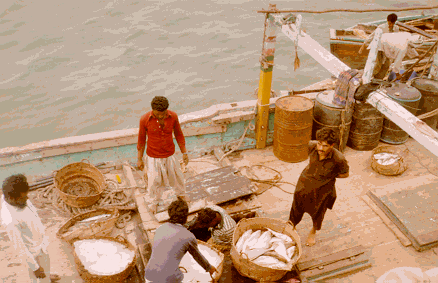Gwadar
Gawadar or Gowader, has been recently developed as a free port in Pakistan where there will be a tax holiday for the 40 years. The port has been handed over to the Singapore ports Authority to handle its operation from scratch. The port will serve the Pakistani exports as well as it will serve as hub for exporters of Middle east At present there may not be much for a pleasure seeking traveler but it is going to become a modern city. A 5 star hotel has already been stared in Gawadar and more will come soon.

Gawadar & Surrounding areas
HOTELS
Gwadar is located on the southwestern coast of Pakistan, close to the Strait of Hormuz in the Persian Gulf. More than 13 million bbl/d of oil passes through the strait. It is strategically located between three increasingly important regions of the world: the oil-rich Middle East, heavily populated South Asia and the economically emerging and resource-rich Central Asia. .
Vegetation Gwadar
The vegetation in Gwadar consists mainly of grasses and spiny scrubs. Grass and fodder plants are fairly numerous in the district. The landscape is featured with chish (acacia), chigird, and kahur (prosopis spicigera) in the plains and gazz (tamarix galica) or tamarisk trees in the beds of torrents. Fodder grass is plentiful and found in places where water is scarce. Some plants of pharmaceutical importance including aishak, guldir, morpuzo, danichk (Ispaghol), keraich, udesh are also found in the district. A frequently found plant is pish (nannorhops ritchieana) or dwarf palm which is used for construction of huts in some areas of the district.
History
The Makran region surrounding Gwadar was occupied by
unknown Bronze age people who settled in the few oases. It later became the
Gedrosia region of the Achaemenid Persian empire. The region is believed to have
been conquered by the founder of the Persian empire, Cyrus the Great. The
capital of the satrapy of Gedrosia was Pura, thought to have been located near
modern Bamp?, in Iranian Balochistan. During the homeward march of Alexander
the Great, his admiral Nearchus led a fleet along the modern Makran coast and
recorded that the area was dry and mountainous, inhabited by the Ichthyophagoi
or Fish eaters - a Greek rendering of the ancient Persian phrase Mahi khoran,
which has become the modern word Makran.[4]
After the collapse of Alexander's empire, the area was ruled by Seleucus Nicator,
one of Alexander’s generals, but the region came under local rule about 303 BC.
For several centuries, the region remained on the sidelines of history, until
the Muslim Arab army under Muhammad bin Qasim captured the town of Gwadar in 711
AD. In the following centuries the area was contested between various powers
including the Mughals and the Safavids.
Portuguese explorers captured and sacked Gwadar in the late 16th century. This
was followed by centuries of local rule by various Baloch tribes. In 1783 the
Khan of Kalat granted Gwadar to Taimur Sultan, the defeated ruler of Muscat.[5]
When Taimur recaptured Muscat, he continued to rule Gwadar by appointing a wali
or governor. The new governor was ordered to conquer the nearby coastal town of
Chah Bahar (in modern Iran). Gwadar fort was built during Omani rule, whilst
telegraph lines were extended into Gwadar courtesy of the British. In 1958, the
Gwadar enclave was transferred to Pakistan after Aga Khan III paid ?3 million
and gifted Gwader to Pakistan and it was made part of Balochistan province.
However, some local residents continue to debate the merits of the Pakistani
buyback.
In 2002, Gwadar Port project to build a large deep-sea port was begun in the
town. The government of Pakistan intends to develop the entire area in order to
reduce reliance on Karachi for shipping. In addition to expanding port
facilities, the project aims to build industrial complexes in the area, and to
connect the town via a modern highway to the rest of Pakistan. China is
providing help on the project, and the first phase was completed by the end of
2004.
Culture
 Gwadar's
location and history have given it a unique blend of inhabitants. The Arab
influence on Gwadar is strong due to Omani rule and the close proximity of Arab
regions. The presence of the Omani slave trade is felt in the town with people
descended from African slaves who passed through the town. The area also has
remarkable religious diversity, being home to Muslims, Christians, Hindus,
Qadianis, Parsis and other minor Islamic sects. Among the most important
religious sects is the Zikri sect, a faith that about half of Gwadar's
inhabitants claim to follow.
Gwadar's
location and history have given it a unique blend of inhabitants. The Arab
influence on Gwadar is strong due to Omani rule and the close proximity of Arab
regions. The presence of the Omani slave trade is felt in the town with people
descended from African slaves who passed through the town. The area also has
remarkable religious diversity, being home to Muslims, Christians, Hindus,
Qadianis, Parsis and other minor Islamic sects. Among the most important
religious sects is the Zikri sect, a faith that about half of Gwadar's
inhabitants claim to follow.
Marriages in Gwadar
In Gwadar district, marriage rituals significantly differ from those in other areas of Balochistan. Unlike other parts of Balochistan, labb (bride price) or haq mehr (dower) received in a marriage contract is owned by the bride herself and she has the full right of spending or dispensing it. Haq mehr is more prevalent in Gwadar and the parents of the bride do not get any money from the groom’s parents. Endogamy is the prevalent style of marriage specially among Hakims. Most of the people are monogamous as a second marriage is expensive. The custom of bride exchange is not practised in Gwadar.
The marriage starts with search of a bride by the grooms father. Mothers have very little role in decision making about the marriage of their son or daughter. Neither the groom nor the bride is allowed to choose his or her life partner. Decision of the parents is considered final, however sometimes the bridegroom is consulted before the final decision. When parents of the groom selects a bride for their son, they make a formal proposal to the bride’s parents who have full authority to accept or reject the proposal. If both parties agree for marriage, details of the marriage including amount of haq mehr and dates of wedding are finalised. Some people arrange mangni (engagement ceremony) also. Customary haq mehr contains 40 sona (about 110 grams of gold), 80 date trees, some land along with irrigation water rights, and 20-30 pieces of clothes are given by the groom to the bride. At the time of nikah the parents of the groom give about 10 thousand rupees, 2 bags of floor, 1 bag of sugar, 1 bag of rice, 1 tin of ghee (cooking oil), enough quantity of condiments and spices, and 5-6 goats or sheep to the bride’s parents for arranging a feast. After marriage, the groom stays for three nights at the bride’s home. After that he takes her to his home.
The bride has full autonomy in using, spending, or selling the items received as haq mehr. Only a part of the haq mehr is paid in actual at the time of marriage and the remaining is given in written form. If the husband divorces his wife, he will have to pay the haq mehr in full. If the wife demands divorce, she will have to withdraw from all her rights on haq mehr. The wife’s rights on haq mehr not only give her economic independence to some extent, but also raise her social status. This is the reason that the amount of haq mehr is considered a matter of social prestige for both the parties. After the death of the wife, the amount of haq mehr is divided among her children according to Muslim inheritance laws.
Transport
Gwadar CityGwadar is located on the Gulf of Oman close to the entrance of the Persian Gulf, about 460 kilometres west of Karachi. In 1993, Pakistan started feasibility studies for the development of a major deepwater seaport at Gwadar. The port project commenced on 22 March 2002 with the first phase completed in December 2005.
The construction of the port has spurred other major
infrastructure projects in the area. This includes the 700 km Makran Coastal
Highway which is now complete. The road links Karachi with several ports along
the coast including Ormara, Pasni, Gwadar and will be extended to the Iranian
border in the future. The highway has reduced travel time to Karachi from 48
hours to only 7 hours. Other road projects include the Gwadar-Quetta-Chaman road
which is due for completion in 2006 and a roadlink to the town of Khuzdar in
eastern Balochistan. There are also plans for a terminal for passenger ships.
The Civil Aviation Authority of Pakistan has earmarked 3000 acres (12 km?) of
land for Gwadar International Airport which will be built 26 km away to the
northeast of the existing airport towards Pasni and is likely to cost between
$200-250 million. The new airport will be given international status and operate
under the open sky policy. In the meantime there are plans to improve facilities
at the existing airport.
Geopolitical importance
Strategic location of Gwadar, and possible oil lines
through the regionThe Gwadar deep-sea port emerges as a place of great strategic
value, enhancing Pakistan's importance in the whole region, extending from the
Persian Gulf through the Indian Ocean to Southeast Asia and the Far East.
Gwadar is located on the southwestern coast of Pakistan, close to the important
Straits of Hormuz, through which more than 13 million bbd of oil passes. It is
strategically located between three increasingly important regions of the world:
the oil-rich Middle East, heavily populated South Asia and the economically
emerging and resource-rich Central Asia.
The construction of the Gwadar deep-sea port is just one component of a larger
development plan which includes building a network of roads connecting Gwadar
with the rest of Pakistan, such as the 650 km Coastal Highway to Karachi and the
Gwadar-Turbat road (188 km). This network of roads connects with China through
the Indus Highway. Pakistan, China, Kazakhistan, Kyrgizstan and Uzbekistan are
developing extensive road and rail links from Central Asia and the Chinese
province of Xinjiang to the Arabian Sea coast.
The Government has initiated several projects, with majority financial and
technical assistance from China, to develop Gwadar's strategic location as a
goods transit and trade point. The primary project is the construction of a
deep-sea port at Gwadar to enable high-volume cargo movement to and from the
landlocked Central Asian states. The new port will also encompass conversion
facilities to allow for the movement of natural gas as a part of plans for a
termination point for the Turkmenistan-Afghanistan-Pakistan natural gas
pipeline. The secondary project is a coastal highway connecting Gwadar to
Karachi, whose $200 million cost will be completely financed by the Chinese.
Gwadar will serve as a port of entry for oil and gas to be transported by land
to the western regions of China. China has been promised sovereign guarantees
for use of the ports.
Economic forcasts
The government declared Gwadar port a "Special Economic Zone" in the budget, 2003-2004. All banks will open their branches, five star hotels will be built, offshore banking will be started, factories, warehouses and storage will be set up, the tourism industry will be promoted in the area, an export processing zone will be set up, making Pakistan a very attractive place for direct foreign investment, and Gwadar port a regional hub of trade and investment activities.
Development Projects
Oman
Oman has offered $100 million aid for the development of social and infrastructure facilities in Balochistan. Out of $100million, Oman has provided $7million for extending of runway at Gwadar Airport, construction of jetties, upgradation of Gwadar Hospital, provision of 100 engines to fishermen and construction of power house. Oman is also financing construction of Gwadar-Hoshab Road, water supply scheme in Gwadar area and construction of irrigation dams.
Pakistan and Oman have signed a number of agreements including Avoidance of Double Taxation, Promotion and Protection of Investment, Cultural, Technical and Educational Cooperation, Agreement on cooperation between Oman Chamber of Commerce and Industry and FPCCI, Maritime Boundary Agreement and Agreement to establish Pak-Oman Joint Investment Company.
The proximity of Oman is an asset to Pakistan. Around 70,000 Pakistani citizens are participating in the development of Oman. Omani assistance for construction of Gwadar Port would go a long way in promoting economic relations between Gwadar-Pakistan and Central Asian States.
Pakistan
Pakistan through networking of roads is linking Gwadar with Karachi and the
north to enable the Central Asian States to use Gwadar as a port for their
trade. Water supply is being improved, seven jetties are being constructed and
local fishermen are being given motor engine run boats. The local hospital is
also being upgraded.
A number of electric power generation projects are also being carried out in Gwadar and in its surroundings. The Quetta Electric Supply Company (QESCO), a subsidiary of the Wapda, has geared up the work for building the power transmission line. It is expected to be completed soon.
Airport
Gwadar has a small airport which is basically meant for fokker aircraft. The
need is growing for the expansion of this airport and enlargement of its runway
to facilitate the landing of wide body aero-planes. CAA has been directed to
upgrade the Gwadar Airport for the landing of Airbuses by the end of 2004.
Gwadar port will be open air and after its inauguration the jet planes shall be
landing at the Gwadar airport. A sum of 2.3 million dollars is being utilized
from Omani grant. The Pakistan government and the Civil Aviation Authority are
also contributing additional Rs563.35 million for this purpose.
Dry Port
China wants to set up a dry port near the Pakistan-China border, so that western
China could also benefit from the Gwadar seaport and it will create a ribbon of
economic activity and hundreds of new jobs along the proposed highway linking
Gwadar with the Karakoram highway in the north.
Rice zone
Rice Exporters Association of Pakistan (REAP)-apex body of the rice exporters in
the country- has decided to establish a rice zone in Gwadar to fetch the
opportunities in the area after the construction of new port. The establishment
of warehouses will provide extraordinary facilities to rice exporters especially
for those who export rice to Iran as the Iranian border is only at a distance of
three hours from Gwadar.
Saindak Copper Gold
The Saindak Copper Gold project is likely to start production in june 2003 by
producing 12500 tons 'raw copper' daily. MRDL, a chinese company, is doing the
whole work. To ensure successful implementation of the mega project modern
machinery, including crushers, smelters and other plants have been installed in
addition to a 50 MW power-house. 33 km railway line from Taftan to Saindak has
also been laid. The Chinese company MRDL has so far invested $25 million (Rs 1.5
billion) on the project.
Trans-Afghan Gas Pipeline
The 1400km-long Trans-Afghan Gas Pipeline (TAP) from Turkemenistan to
Gwadar(Pakistan), the long dormant project that hopes to pump Turkmen natural
gas to markets in South Asia, is finally poised to step off the drawing board
costing $3 billion.
Sutkagen Dor Archeological site near Gwadar
Travel & Culture Services Pakistan
220A Panorama center Fatima Jinnah Road Karachi
Email : Click Here To contact
us.
Slide Show - Online Booking
| Home | Pakistan Tours | Conferences & Incentives | Hotels | Islamabad | Karachi | Lahore | Peshawar| Quetta | Multan | Hyderabad | Hunza | Gilgit | Chitral | Swat | Karakorum Highway | History of Pakistan
| Archeology | Weather
| Security | Contact
Information |
Advertisement
Advertise on this site click for advertising rates





Kaghan Hotels

Pakistan Tours for Chinese
Tours for Tourists from Thailand
Our Other offices
Dubai Travel & Culture Offerring Tours, Desert Safaris and hotels in Dubai
Sri-Lanka Tours Our Colombo office operating tours in Sri Lanka
Qatar Travel & Culture Tours and travel information about Qatar
Malaysia Travel & Culture Tours and hotels in Malaysia
中文网站 Read this website in Chinese
More offices Details about our company and other offices
